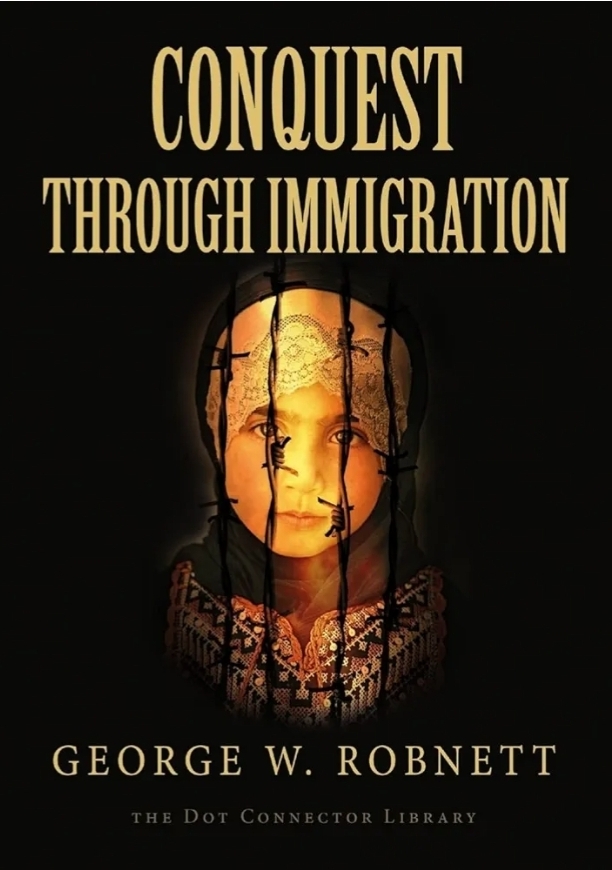George W. Robnett’s Warning—Updated for Our Moment
George W. Robnett argued that immigration can be weaponized—not as charity or normal nation-building, but as a strategic instrument to transform a country’s culture, politics, and power structure without firing a shot. The danger, in his frame, isn’t the dignity or aspirations of individual immigrants; it’s the systems and incentives that turn human movement into a lever for political conquest, economic capture, and administrative centralization.
This article distills Robnett’s core idea and maps it onto today’s realities: managed crises, NGO-industrial pipelines, corporate demand for cheap labor, and supranational agendas that balkanize sovereign nations from within.
Robnett’s Core Insight
- Demography is a power tool. If you change who lives where—and under what loyalties—you change who rules.
- Systems, not migrants, drive conquest. Bureaucracies, party machines, financiers, and front groups can use immigration flows to dilute opposition, flip districts, and reconsolidate power.
- Humanitarian language masks strategic aims. “Compassion” becomes a narrative shield for policies that permanently rearrange the electorate and the economy.
The Mechanism of “Soft Conquest”
A. Policy Levers
- Border laxity & asylum abuse: Turning emergency pathways into standing channels.
- Chain migration & birthright incentives: Automatic expansion beyond initial entrants.
- Administrative decrees: Executive actions and consent decrees that bypass the legislature.
B. Institutional Pipeline
- NGO–Government Complex: Federally funded NGOs facilitate transport, placement, benefits, legal navigation—creating a self-financing conveyor belt.
- Corporate Labor Arbitrage: Demand for lower labor costs pressures policy toward high inflow, low assimilation.
- Media & academia: Redefine borders as “xenophobia vs. virtue,” moralizing the issue to block scrutiny.
C. Political Conversion
- District engineering: Rapid population shifts re-map representation and lock in administrative power.
- Dependency politics: Services first, allegiance later; voters align with the entities that deliver permits, benefits, and protection.
D. Cultural Fragmentation
- Parallel norms: Without a strong assimilation ethic, language and legal expectations fracture into micro-regimes.
- Perpetual crisis: Friction becomes the justification for more centralized management—the state that caused the problem becomes the indispensable “solution.”
Balkanization at Home
The “balkanization” lens fits squarely here. The same playbook once used to divide distant states is applied domestically:
- Fragment the polity into linguistic, legal, and cultural enclaves.
- Internationalize governance through treaties, donor flows, and corporate–NGO compacts.
- Financialize the aftermath via debt, grants, and permanent “temporary” programs.
Result: a nation that looks whole on a map but functions as administratively managed zones—with sovereignty replaced by technocratic supervision.
Ethical Clarification (People vs. Systems)
Robnett’s critique targets systems, not immigrants as persons. Any humane and constitutional policy must:
- Defend the dignity and safety of individuals,
- Protect the civic core (the rule of law, assimilation, and equal justice),
- Prevent the exploitation of migrants as political or corporate instruments.
Love the person. Confront the machinery that exploits them.
Objections & Replies
Objection: “Immigration built this country.”
Reply: Yes—lawful, assimilative immigration bound to a civic culture. Robnett warns against mass, unassimilated, administratively weaponized flows.
Objection: “This is economic necessity.”
Reply: Short-term labor gains can hide long-term social costs: wage suppression, public burden, policing complexity, and political capture.
Objection: “It’s compassion.”
Reply: Compassion without order, prudence, and consent becomes a cover for permanent emergency politics.
A Robnett-Inspired Blueprint (Humane, Sovereign, Practical)
1) National-Interest Gatekeeping
- Merit + hardship tiers with fixed ceilings set by Congress, not agencies.
- Sunset clauses on emergency authorities; no open-ended “temporary” programs.
2) Single Standard of Law
- End policy by memo. Major shifts require statute.
- E-Verify with real employer penalties; cut the corporate magnet.
3) Assimilation Contract
- English & civics proficiency tracked to milestones.
- Tie long-term status to clean records, work participation, and civic education.
- Prioritize family unity after civic assimilation benchmarks.
4) NGO & Funding Transparency
- Full public ledgers of who funds what, down to subgrants and travel.
- Ban perverse incentives (per capita placement bounties, “travel stipends” that reward volume).
5) Municipal Impact Veto
- Localities receive pre-placement impact assessments (schools, hospitals, housing, policing).
- No settlement without local consent and funding offsets.
6) Border as a Constitutional Institution
- Physical barriers where effective, plus digital detection, biometrics, and chain-of-custody for asylum claims.
- Fast, fair adjudication with safe-third-country rules to end cartel control.
7) End Birthright Tourism & Fraud
- Clarify statutory intent; tighten documentation, audits, and penalties for organized schemes.
8) Pro–Human Foreign Policy
- Target cartels and corrupt facilitators; penalize governments that export their poor while pocketing remittances.
- Invest in near-shore development compacts that reduce push factors without exporting disorder.
Metrics That Matter (Audit the System, Not the Slogans)
- Time-to-adjudication (median days, not years)
- Workforce substitution indices (wages by sector vs. inflow)
- Assimilation milestones (language/civics completion)
- Local impact scores (ER load, school capacity, housing pressure, crime mix)
- Public cost per entrant (net over 5/10 years)
- Fraud rate & enforcement outcomes (real, audited numbers)
Conclusion: From Robnett to Now
Robnett’s warning was not about closing America; it was about closing the loopholes through which political and corporate powers colonize America—using people as pawns and compassion as cover. A sovereign, moral republic can welcome newcomers while protecting the constitutional core—if it insists on law, assimilation, transparency, and consent.
Conquest through immigration is not inevitable. It happens only when citizens forget that borders, laws, language, and shared civic memory are not bigotry; they are the guardrails of liberty.






